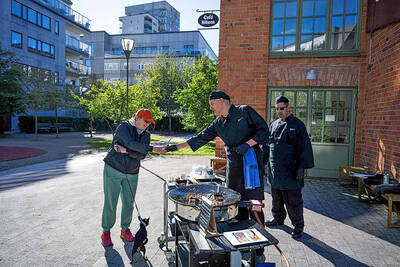Rio’s mayor has a plan he believes can tame this chaotic city, which is both beloved and loathed for the cacophony of sins that reach their apex during Carnival.
His method: a “shock of order” campaign in which even the smallest of offenses will be punished.
His model, apparently, is former New York mayor Rudy Giuliani, whose crackdown on petty crime was credited by many for a remarkable drop in serious crime in the 1990s.
His chances of success in Rio: nil, according to most observers.
After all, how can a zero tolerance policy succeed in a city where everything is tolerated?
Eduardo Paes, the fresh-faced 39-year-old mayor who took office on Jan. 1, is energetically trying to reverse Rio’s reputation as an anything-goes city where savvy citizens learn early that some laws exist only on paper and can be safely ignored.
Paes has the reputation of a micromanager, but yesterday he was to “relinquish” control of the city — ceremonially handing over the keys to King Momo in the official opening of Carnival.
But he isn’t giving up his campaign, even as more than 700,000 visitors crowd the streets.
“We have to give a shock of urban order to the city, an organized posture, to recover authority and better conserve public spaces,” he explained during the mayoral race.
Paes has vowed to reorganize the city in more than 80 ways since he announced his policy — a twist on both former US president George W. Bush’s “shock and awe” campaign that opened the war in Iraq and Brazil’s national motto of “Order and Progress.”
His first targets have been the countless providers of what many citizens consider to be useful — if illegal — services in Rio’s informal economy.
From men who sell boiled corn in the streets, to boys who demand coins to safeguard cars from thieves, to women hawking ice-cold beer from small coolers on Copacabana beach, hundreds of these workers have felt the pinch.
“I’ve been selling books here for 40 years,” said Rubem da Consigao, 71, a wisp of a man whose small folding table held 100 used volumes in the posh Ipanema neighborhood. “Then last week, the police came, said I didn’t have a vendor’s license, took my books and said they would burn them. This country is full of thieves — if they take the bread from my hand, there is going to be one more.”
Many such workers say they have been hassled by police. Almost all say they have little choice but to keep working illegally.
Informal economies have both positive and negative aspects, said Maria Jose Soares, whose book Street Business examined the lives of informal workers across the globe. “The good are supporting their families in a peaceful way, whereas the alternative is violence and crime. The government has to distinguish between the two.”
But Paes has said that Rio lost its luster long ago by allowing little crimes to tarnish its reputation: “I’ve never lived in the Marvelous City,” he has said, invoking one of Rio’s old nicknames.
At stake is not just a young mayor’s pride: Rio hopes to shine when Brazil hosts the 2014 football World Cup, and is among four finalists to host the 2016 Summer Olympics.
Paes appointed a new “Secretary of Public Order,” who saw to it that within two weeks of taking office, the “shock of order” campaign had demolished an illegal four-story condominium, confiscated 260 tonnes of goods sold by illegal street workers, towed 477 cars, removed 436 homeless people and handed out 3,457 fines.
Brazilian media applauded. But within days, the depth of Rio’s social ills was evident: Rusting VW vans returned, homeless people still wander, a pirated DVD can be purchased just about anywhere.
And unlicensed vendors are selling a tremendous amount of beer.

READINESS: According to a survey of 2,000 people, 86 percent of Swedes believe the country is worth defending in the event of a military attack Swedes are stocking up on food items in case of war, as more conflict in Europe no longer feels like a distant possibility, and authorities encourage measures to boost readiness. At a civil preparedness fair in southwest Stockholm, 71-year-old Sirkka Petrykowska said that she is taking the prospect of hostilities seriously and preparing as much as she can. “I have bought a camping stove. I have taken a course on preservation in an old-fashioned way, where you can preserve vegetables, meat and fruit that lasts for 30 years without a refrigerator,” Petrykowska said. “I’ve set aside blankets for warmth, I

FRUSTRATIONS: One in seven youths in China and Indonesia are unemployed, and many in the region are stuck in low-productivity jobs, the World Bank said Young people across Asia are struggling to find good jobs, with many stuck in low-productivity work that the World Bank said could strain social stability as frustrations fuel a global wave of youth-led protests. The bank highlighted a persistent gap between younger and more experienced workers across several Asian economies in a regional economic update released yesterday, noting that one in seven young people in China and Indonesia are unemployed. The share of people now vulnerable to falling into poverty is now larger than the middle class in most countries, it said. “The employment rate is generally high, but the young struggle to

ENERGY SHIFT: A report by Ember suggests it is possible for the world to wean off polluting sources of power, such as coal and gas, even as demand for electricity surges Worldwide solar and wind power generation has outpaced electricity demand this year, and for the first time on record, renewable energies combined generated more power than coal, a new analysis said. Global solar generation grew by a record 31 percent in the first half of the year, while wind generation grew 7.7 percent, according to the report by the energy think tank Ember, which was released after midnight yesterday. Solar and wind generation combined grew by more than 400 terawatt hours, which was more than the increase in overall global demand during the same period, it said. The findings suggest it is

‘ARMED CONFLICT’: At least 21 people have died in such US attacks, while experts say the summary killings are illegal even if they target confirmed narcotics traffickers US forces on Friday carried out a strike on an alleged drug-smuggling boat off the coast of Venezuela, killing four people, US Secretary of Defense Pete Hegseth said. The latest strike, which Hegseth announced in a post on X, brings the number of such US attacks to at least four, leaving at least 21 people dead. An accompanying video shared by Hegseth showed a boat speeding across the waves before being engulfed in smoke and flames. “Four male narco-terrorists aboard the vessel were killed,” the Pentagon chief wrote. He said the strike “was conducted in international waters just off the